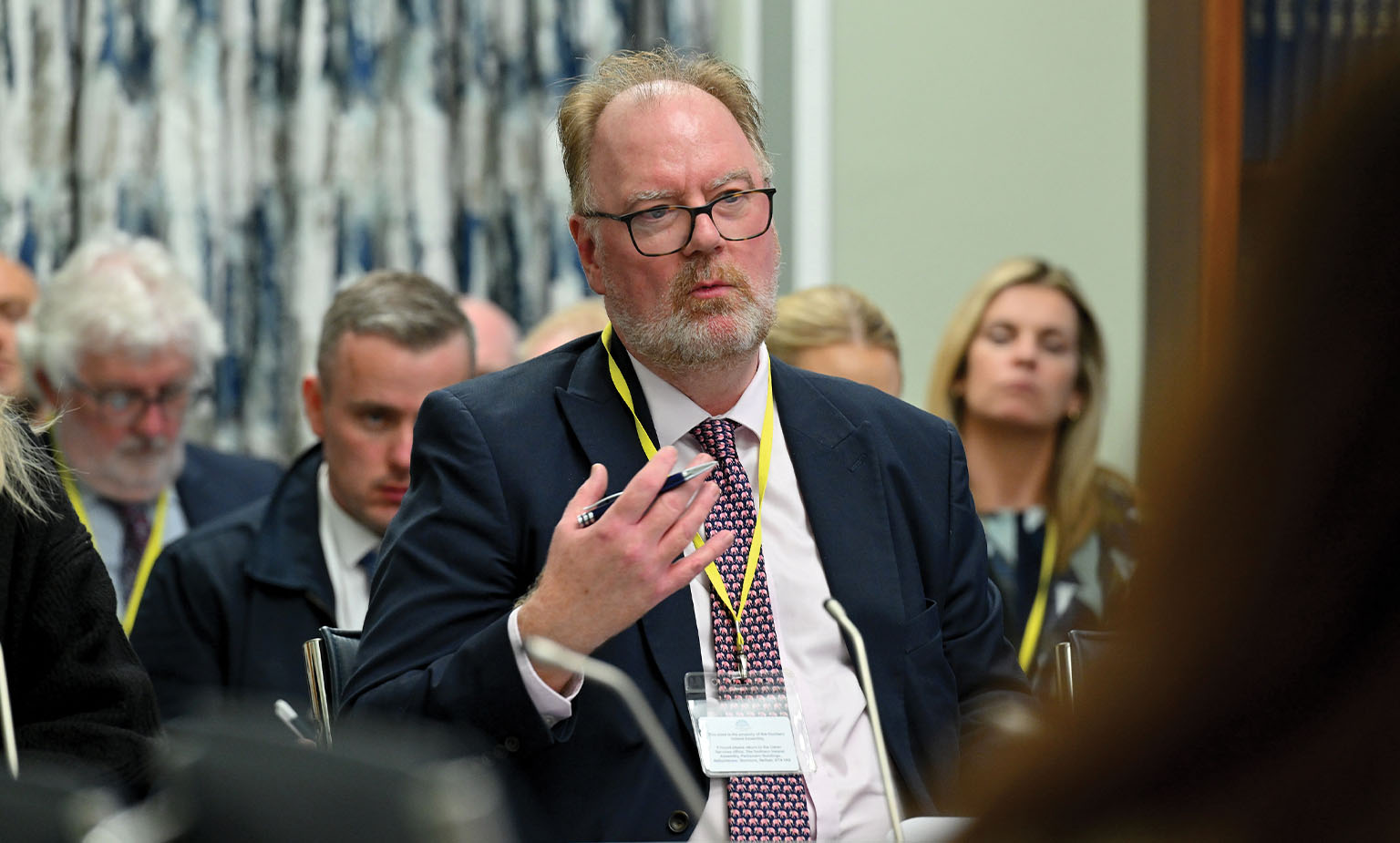The crisis in Northern Ireland’s criminal justice system: Urgent action needed

The Criminal Justice System in Northern Ireland is in crisis. This stark warning, issued by newly elected President of the Law Society of Northern Ireland, Colin Mitchell, highlights a looming disaster that requires immediate attention from Justice Minister Naomi Long MLA and the Northern Ireland Executive.
The crisis within the system is the result of systemic underfunding that has occurred ever since responsibility for policing and justice was devolved to Stormont in 2010. Now, more than a decade later, the full extent of this underinvestment has become painfully apparent. In the face of the Executive’s draft Budget, which threatens to exacerbate this already dire situation, there is an urgent need for reform, proper resourcing, and a clear commitment to ensuring access to justice for all.
A decade of underfunding
The transfer of responsibility for policing and justice to Stormont was intended to allow for more localised decision-making and investment in Northern Ireland’s justice system. However, what has transpired over the last 10 years is an escalating financial crisis within the system, particularly with regard to legal aid funding. This underfunding has now reached a critical point, impacting the ability of legal professionals to provide the essential services that are crucial for the proper functioning of the criminal justice process.
Legal aid has long been a cornerstone of Northern Ireland’s access to justice. Introduced in 1966, it ensures that individuals who cannot afford legal representation receive a fair hearing. However, the level of remuneration for legal aid work has not kept pace with inflation or the rising costs associated with providing such services. For two decades, legal aid fees have remained largely unchanged, despite significant increases in both the complexity and cost of legal cases. This stagnation in funding has resulted in a profession that is increasingly unable or unwilling to carry out this vital work at the current rates.
The consequences of underinvestment
The long-term consequences of chronic underinvestment in Northern Ireland’s criminal justice system are now becoming starkly evident. Perhaps the most immediate issue is the shrinking pool of lawyers willing to work in the criminal courts. The fact is that legal aid fees are now so low that they no longer reflect the time, expertise, and commitment required by those who represent individuals facing criminal charges. Legal professionals, including solicitors and barristers, are increasingly withdrawing from cases because the financial viability of providing these services is simply no longer sustainable.
This development is both regrettable and inevitable. No professional group, be it in the legal field or any other sector, can be expected to work for rates of pay that are far below what is required to keep a business running. As lawyers withdraw from the system, it directly impacts the quality of legal representation and the timely delivery of justice. With fewer lawyers available to take on cases, courtrooms become more congested, defendants face delays in receiving their day in court, and ultimately, individuals are denied access to the timely justice they are entitled to under the law.
It is not simply a matter of lower pay for lawyers; the underlying issue is that the criminal justice system in Northern Ireland is becoming less functional with each passing day. When defendants cannot find lawyers to represent them, it disrupts the balance of justice. This ripple effect reverberates throughout the system, contributing to delays in trial dates, overcrowding in prisons, and the undermining of the public’s faith in the ability of the criminal justice process to work fairly and efficiently.

The failure of reform proposals
Justice Minister Naomi Long MLA, recognising the need for reform, appointed Judge Tom Burgess to undertake a review of criminal legal aid. The review, completed at the end of August 2024, sought to address the funding problem and provide concrete recommendations for reform. However, rather than acting swiftly to implement the key recommendations from Judge Burgess’s review, the Minister has proposed an “implementation plan” that is heavily criticised for being overly complex and slow-moving. This proposed plan, critics argue, risks running out of steam without delivering the necessary reforms or, at best, producing limited results that fail to resolve the crisis.
There is widespread concern that, at a time of such urgent need, the failure to expedite the implementation of actionable reforms will only exacerbate the crisis further. As legal aid lawyers continue to withdraw from cases and the legal sector’s ability to function at its most basic level erodes, any delay in delivering on proposed reforms risks pushing the entire system towards complete breakdown.
The legal system cannot continue to function effectively if the professionals upon whom that system depends are being forced to abandon the courts, leaving the most vulnerable in society without access to justice. If the Northern Ireland Executive fails to properly fund the criminal justice system, the already fragile system will collapse under its own weight. Justice is not a luxury – it is a fundamental right, one that must not be compromised.
A call for urgent action
The Law Society’s warning that Northern Ireland’s criminal justice system is teetering on the edge of collapse is not an exaggeration, but a reflection of the immediate threat that lies before us. Without a proper injection of funds into the legal aid system and the broader criminal justice infrastructure, the system risks grinding to a halt. The shortage of criminal lawyers is not simply a manpower issue but one that directly impacts the ability of the public to access fair trials and timely legal processes.
The Northern Ireland Executive must understand that continued failure to address this issue is not an option. Urgent action is required to ensure the sustainability of the criminal justice system. This means an immediate and substantial increase in legal aid funding, as well as a clear commitment to addressing long-term funding shortfalls.
The message from the legal community is clear: without lawyers willing to work in the criminal courts and represent clients in the full spectrum of legal cases, the system will come to a standstill. Without swift intervention, the criminal justice system in Northern Ireland could collapse entirely, with catastrophic consequences for the rule of law, public safety, and civil rights. The time for action is now. The Justice Minister and the Northern Ireland Executive must move beyond vague plans and immediately address the financial crisis within the criminal justice system to prevent a total breakdown of the system.
It is incumbent upon those in positions of power to acknowledge that justice must remain at the heart of government priorities, and the fate of the criminal justice system cannot be sidelined any longer. Immediate action is required to prevent a situation where the most vulnerable in our society are left without the support they need to navigate the criminal justice process.

E: enquiry@lawsoc-ni.org
W: www.lawsoc-ni.org





